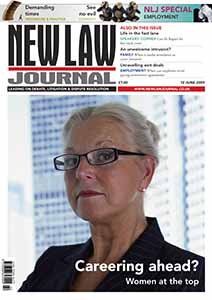
M (a minor by his litigation friend LT) v Ministry of Justice [2009] EWCA Civ 419, [2009] All ER (D) 44 (Jun)
Napier and another v Pressdram Ltd [2009] EWCA Civ 443, [2009] All ER (D) 31 (Jun)
Roger Smith stands up for transparency
Jane Mayfield reviews the FSA’s tougher stance
Personal injury
Ian Barratt explains why employee wellbeing is rising up the work agenda
Legal aid
Kenneth Warner weighs up evidence for causal links in cases of injury
When is media attendance in court intrusive? asks Rebecca Newitt
When is it reasonable to make a possession order? asks James Driscoll
MOVERS & SHAKERS

NLJ Career Profile: Ken Fowlie, Stowe Family Law
Ken Fowlie, chairman of Stowe Family Law, reflects on more than 30 years in legal services after ‘falling into law’

Gardner Leader—Michelle Morgan & Catherine Morris
Regional law firm expands employment team with partner and senior associate hires

Freeths—Carly Harwood & Tom Newton
Nottinghamtrusts, estates and tax team welcomes two senior associates







